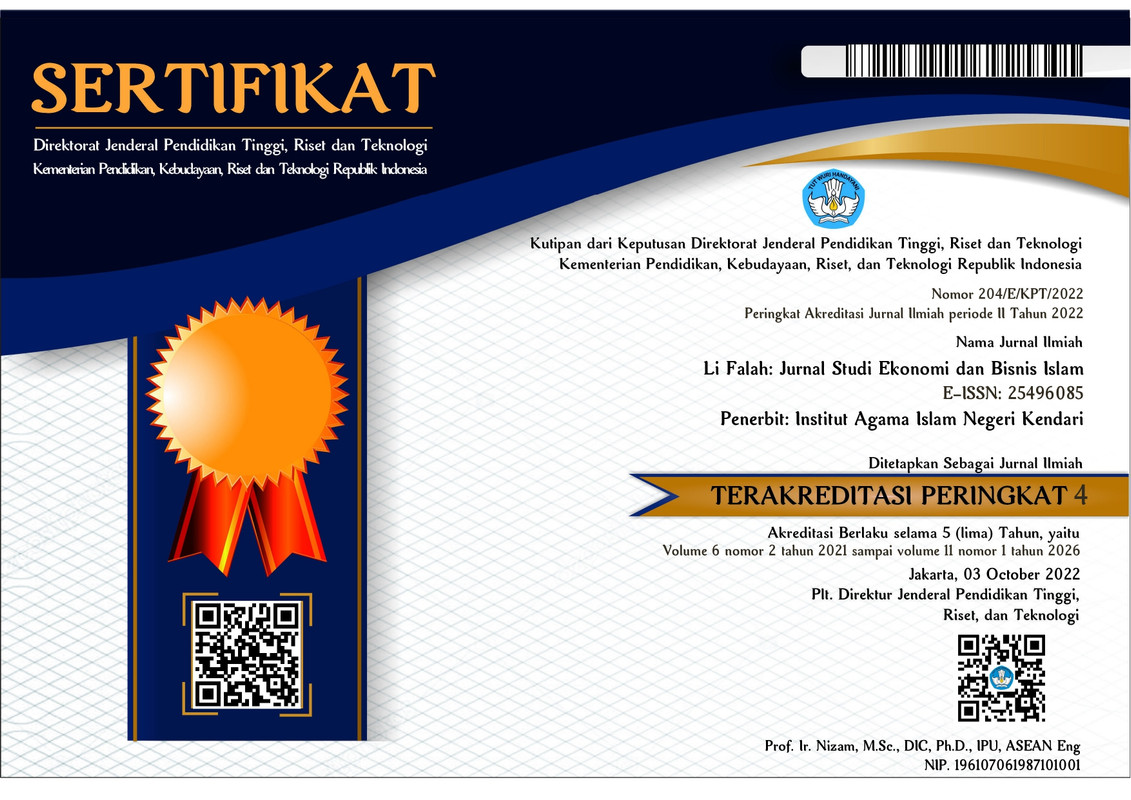Government Expenditure on Education and Health: Islamic Economic Perspective on Poverty Alleviation in Lampung Province (2018-2022)
Abstract
Keywords
Full Text:
PDFReferences
Djamil, F. (2013). Hukum Ekonomi Islam: Sejarah, Teori, dan Konsep,. In Ekonomi Islam.
Ferezagia, D. V. (2018). Analisis Tingkat Kemiskinan di Indonesia Jurnal Sosial Humaniora Terapan. Jurnal Sosial Humaniora Terapan, 1(1).
Hidayat, A. Y., & Azhar, Z. (2022). Analisis Pengeluaran Pemerintah Di Sektor Kesehatan, Pendidikan, Dan Infrastruktur Terhadap Tingkat Kemiskinan Di Indonesia. Jurnal Kajian Ekonomi Dan Pembangunan, 4(1). https://doi.org/10.24036/jkep.v4i1.13308
Nenbee, S. G., Aleogho, I. Z., Vite, B. N., & Otovwe, E. E. (2021). An Empirical Investigation of Government Spending in Primary School Enrolment and Poverty Reduction in Nigeria. International Journal of Research in Humanities and Social Studies, 8(6).
Nur Chamid. (2010). Jejak langkah Sejarah pemikiran Ekonomi Islam. Jakarta Pustaka Belajar.
Rizal, A., & Yantieka, N. (2022). Analisis Regresi Data Panel Untuk Pemodelan Kemiskinan Pulau Sumatera Dengan Variabel Pendidikan Tahun 2016 – 2021. ETNIK: Jurnal Ekonomi Dan Teknik, 1(7). https://doi.org/10.54543/etnik.v1i7.91
Septriani, S. (2023). ANALISIS PENGARUH PENGELUARAN PEMERINTAH TERHADAP KEMISKINAN DI PROVINSI BENGKULU. Jurnal Ekonomi Dan Pembangunan, 14(1). https://doi.org/10.22373/jep.v14i1.779
sugiyono, dr, P. (2015). Metode Penelitian Kuantitatif, Kualitatif, dan R&D – MPKK. In Metode Penelitian Manajemen. Bandung: Alfabeta.
Suharto, E. (2015). PERAN PERLINDUNGAN SOSIAL DALAM MENGATASI KEMISKINAN DI INDONESIA: STUDI KASUS PROGRAM KELUARGA HARAPAN. Sosiohumaniora, 17(1). https://doi.org/10.24198/sosiohumaniora.v17i1.5668
Sujarweni, & Wiratna. (2019). Metodologi Penelitian Bisnis & Ekonomi. In Yogyakarta: Pustaka Baru Press (Vol. 9, Issue 2).
Suparlan, P. (1993). Kemiskinan di Perkotaan. In Yayasan Pustaka Obor Indonesia.
Surjaningsih, N., Utari, G. A. D., & Trisnanto, B. (2012). DAMPAK KEBIJAKAN FISKAL TERHADAP OUTPUT DAN INFLASI. Buletin Ekonomi Moneter Dan Perbankan, 14(4). https://doi.org/10.21098/bemp.v14i4.365
Susanti, Endah, Hidayat, N. (2020). Analisis Pengaruh Pengeluaran Pemerintah Sektor Pendidikan, Kesehatan, Dan Infrastruktur Terhadap Indeks Pembangunan Manusia Di Provinsi Kalimantan Timur. Eco-Build Journal, 4(2).
DOI: http://dx.doi.org/10.31332/lifalah.v9i1.9842
Copyright (c) 2024 Lulu Irmayanti, Mardhiyah Hayati, Okta Supriyaningsih

This work is licensed under a Creative Commons Attribution-ShareAlike 4.0 International License.
Li Falah : Jurnal Studi Ekonomi dan Bisnis Islam, Indexed In
Accredited By
View My Stats
Organized by : Fakultas Ekonomi dan Bisnis Islam
Published by : Institut Agama Islam Negeri Kendari
Jl. Sultan Qaimuddin No. 17 Baruga Kota Kendari Provinsi Sulawesi Tenggara
phone. +62401-3193710
Fax. +62401-3193710
Email: [email protected]












